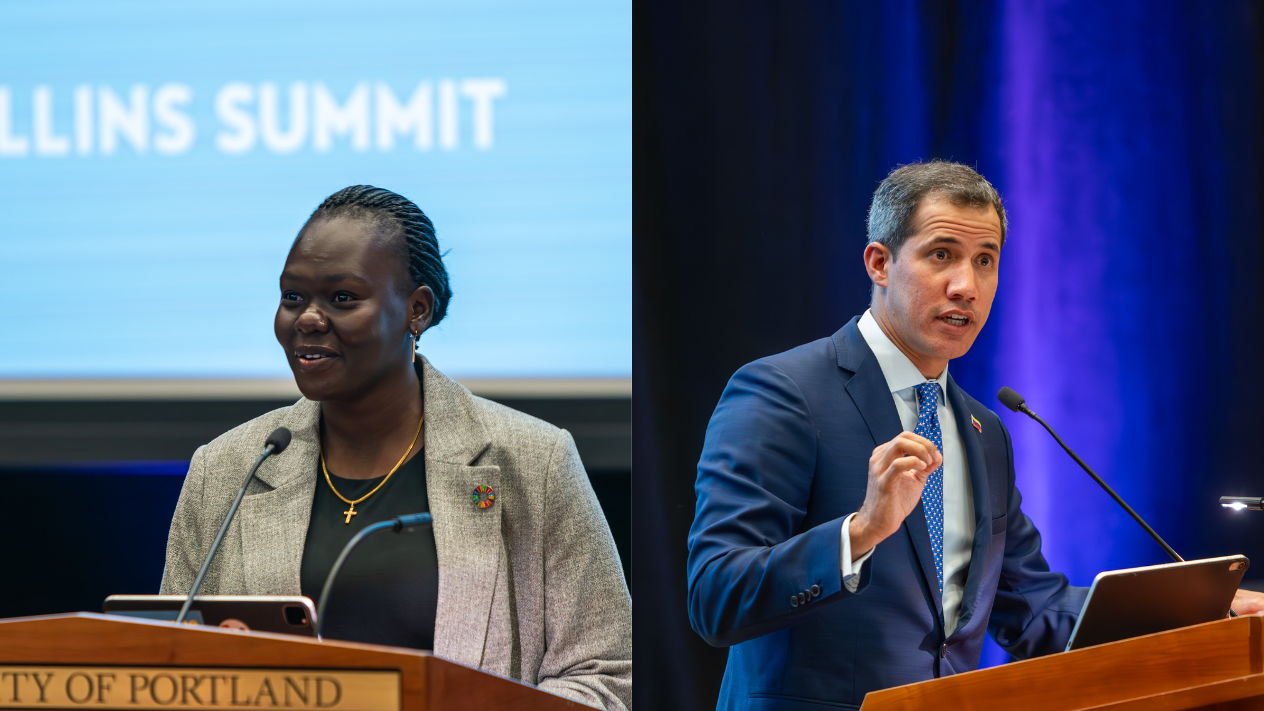August 12, 2024
South Sudan’s representative to the United Nations and Venezuela’s former interim president visited the University of Portland campus on the evening of August 8 to headline the 2024 Ecumenical Ministries of Oregon (EMO) Collins Lecture — “Faith and Politics in a Divided World.”

In February, Ambassador Cecilia Adeng became the first female appointed as South Sudan’s permanent UN representative since the country achieved independence in 2011.
EMO invited Adeng to speak alongside Venezuela’s former opposition leader Juan Guaidó, who was recognized as acting president of Venezuela from January 2019 through January 2023. Guaidó, currently living in exile in the U.S., recently urged the world to recognize his nation’s opposition candidate, Edmundo González, who challenged Venezuelan President Nicolás Maduro in a late-July election.
“We are in the middle a presidential campaign in the United States, and the issues have become so contentious between extremes,” EMO Executive Director Frank So said prior to the Collins Lecture. “I felt that bringing leaders from other parts of the world could give us some context as to what struggles they’re dealing with — to help people listen and really try to understand issues – not just listening to argue.”
Prior to the lecture, Ambassador Adeng and Mr. Guaidó offered perspectives on the topic and how faith and hope tie into the work their do for their countries. Responses have been edited for length and clarity:
The Collins Lecture is titled “Faith and Politics in a Divided World.” What is the role of faith in politics, especially during these times?
Juan Guaidó: “That’s a bold phrase, faith and politics. I was raised in a Catholic family. When you’re passing through a difficult situation, dark hours and moments, faith and your confidence in the other is more powerful than anything. Hope for a better tomorrow. A better society. Leadership is about faith. It’s about belief. It’s about bringing hope. I’m very interested in the intersection of politics, leadership, faith and belief.”
Ambassador Cecilia Adeng: “Being at the United Nations, I don’t see a lot of trust among the member states to carry out the work that we need to do. I have my faith. In my prayers I say, ‘Whatever I do here is on behalf of the people of South Sudan and on behalf of making the world a better place.’ I want to be the voice of the voiceless. When you’re a person of faith, you know that love — loving God and loving your neighbors — is what you’re put here for.”
Are faith and hope strong in your countries?
Adeng: “There is nothing but hope that drives us in South Sudan. When I was a child, I went to sleep praying that my mom would be able to sell a few of her goodies in the mornings so she would be able to give us bread and tea. It was with faith that I went to school knowing that by the time I came back she would have sold more of her goodies so we would have dinner. As a country, we had faith that our forefathers would achieve this country called South Sudan, which was realized in 2011. We’re going through the troubles of nation-building, but through prayers we have faith that God will put us on the right path.”
Guaidó: “In my country, back in 2018, we were hopeless. We were trying to achieve democracy and liberty. In 2019, we mobilized and the only thing that changed was hope. Hope brought light to our people. In this moment, I can almost see that hope again. It is material — you can touch the hope, you can touch the faith, you can touch the love. And that drives you.”
Why do you do what you do for your people?
Guaidó: “When you can’t even say what you think aloud in your country — when you don’t have water, electricity, gasoline — you know things are not good. I don’t want my two little girls — who are ages seven and two — to think that they don’t have rights. Or that they can’t achieve half of their rights. I am a citizen. I want all of my rights. I want to speak aloud about what I think. Leadership is about taking responsibility and doing the work. I have faith that this inflection point will take us to a better place. But it depends on us.”
Adeng: “The biggest reason why I do what I do is because I don’t want another generation to live how I’ve lived. A life of fear, a life of running, not having stability, not having security. That alone pushes me to do what I do every day. God gave me the ability to come to the U.S., so I am able to give back. This is God’s calling. And I will gladly do it until the last breath that I have within me.”
University of Portland
5000 N. Willamette Blvd.,
Portland, Oregon 97203-5798
503.943.8000
This website uses cookies to track information for analytics purposes. You can view the full University of Portland privacy policy for more information.
